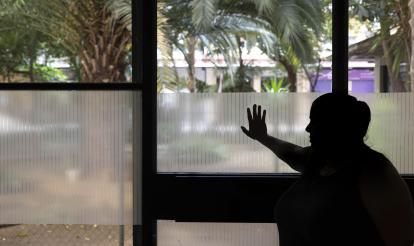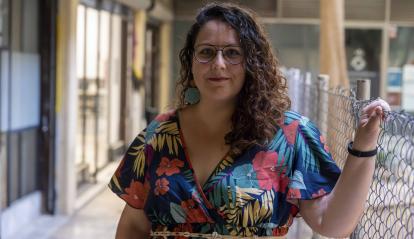
You are reading:

You are reading:

People who have overcome addiction face barriers and discrimination when trying to access employment – a key factor in their social reintegration and in preventing relapse. Alma has achieved this, with support from Projecte Home Catalunya and the Incorpora programme run by the ”la Caixa” Foundation.
Four years ago, Alma was addicted to cocaine. Some people even told her that she would never recover, would never work again, never be able to live a normal life. Today, Alma (not her real name, as she prefers to protect her identity) has a permanent contract for a job with good hours in the metal industry. She has been clean for four years.
Her recovery process began alone. “I admitted myself to the first centre. My family didn’t know anything. They found out after I’d already checked in,” she recalls. “I went to the psychiatric hospital and said, ‘I have a problem. I’m addicted and I want to get better. Can you help me?’. And I was admitted,” she continues.
From there, she went through several centres where she had negative experiences: “They overmedicated me. I was in a sort of vegetative state: I hardly spoke, I had lost my motor skills… In terms of addiction, I was better because I wasn’t using drugs, but on a personal level, I was getting worse.” That’s why she decided to leave. Later, her family, now involved in helping her, found Projecte Home Catalunya, where she joined despite initially not wanting to. “It’s the best thing I’ve ever done in my life,” Alma now says.
Projecte Home Catalunyais an association that has been helping people with addiction problems and their families for over 40 years. It supports them through treatment and in rebuilding their lives. Finding a job is an important part of this process, something that is often not easy.
“People who have overcome some form of addiction face various barriers when trying to enter the job market,” explains Aïda Quesada, employment integration officer at Projecte Home Catalunya. “Above all, due to social stigma, discrimination related to their past, their lack of recent work experience, low qualifications, lack of specific training… And in many cases, though not all, associated mental health issues,” she clarifies. She also adds “the difficulties in terms of family and social relationships and the absence of positive role models in the workplace.”

To help overcome these obstacles, the association supports the people it works with on their path towards social and labour integration. It does not do this in isolation: it is part of the Incorpora programme run by the ”la Caixa” Foundation, an initiative that operates as a network of over 400 organisations to help people at risk of social exclusion gain access to employment.
“We work extensively to raise awareness among companies about the reality faced by people with addictions, showing them that recovery is indeed possible and that integration into the workplace is a key step in that process,” says Quesada. “We provide support both to the candidate and to the company throughout the entire recruitment process, and we adapt profiles to match the real needs of the position. We follow up with them and carry out various types of intervention,” she explains.
In Alma’s case, she first secured a few temporary contracts through the Incorpora programme. Later, she returned to the service and they continued to help her. “We designed her individual pathway based on her expectations and interests, her training and her experience. After identifying her strengths and supporting her in areas for improvement, we began looking for different opportunities,” the adviser recalls. The outcome was very positive: “She went for an interview at a company, and the HR person liked her so much that, although it was initially a temporary contract, they ended up offering her a permanent one.”
Alma values the support she has received from Projecte Home Catalunyaand Incorpora throughout the process. “They’ve supported me every step of the way. Helping me with paperwork for the tax office or Social Security, with outstanding personal matters… They helped me update my CVs and showed me how to navigate job applications,” she says. She gives an example: “I didn’t even know how to send an email, and they set up an account for me.”
For those who have overcome an addiction, getting a job is much more than just employment. “It gives them structure, a sense of responsibility and self-esteem. It promotes their autonomy, both financial and personal. And it also acts as a protective factor against relapse,” explains the employment integration officer. She adds that “having a job helps rebuild personal and social identity, improves mental health and makes full integration into society easier.”

Some 85% of the people supported by Projecte Home Catalunya are men, and about 15% are women. The average age is 43. In 45.5% of cases, social benefits are their main source of income. Additionally, one in three people has a mental health issue alongside their addiction.
For Aïda Quesada, the Incorpora programme “is essential as a bridge between the people we support and companies,” as it “facilitates job placement, promotes inclusive hiring and provides resources, training and guidance to both users and businesses.” “It also trains us professionals so that we have the tools, methodology and everything we need to do our jobs well,” she adds.
Through the Incorpora programme, 1,118 people who had overcome an addiction were supported last year, and 544 of them (48.6%) achieved job placement. This was made possible thanks to 353 hiring companies and the collaboration of social organisations such as Projecte Home Catalunya, which contributed with 269 individuals assisted and a total of 119 job placements.
The adviser highlights that the programme is also beneficial for companies that turn to it for staff. “In a business, time is money. The fact that we can pre-screen CVs and even help with the recruitment process saves them time,” she points out. She adds that “the companies involved appreciate the collaboration and especially value the personalised support and the way candidate profiles are tailored to their needs.” “Trust is built through the networking of the various organisations that make up the Incorpora programme, the training provided and the ongoing support, which is what allows companies to feel confident and supported throughout the process,” she concludes.
Positive experiences of someone entering employment serve as an example to others. “Working in the field of addiction is a fight against fear and prejudice. Every story shared, every job placement helps break the taboo and build a fairer and more inclusive society,” Quesada argues.
She stresses that “stigma remains deeply rooted in society, and prejudice leads to shame, guilt and isolation, which are the main barriers preventing people from seeking help in time.” That is why she emphasises the need to “break down society’s mistaken perception of people with addictions, as there’s a belief that someone who has been in treatment is less competent, when in reality they’ve worked hard on things like autonomy, responsibility and mental health.”
Alma’s story is one of many that can help break this stigma. What would she say to others in a similar situation? “That there’s life after hell. But you have to want to get out of it.” She explains that “the first step is recognising you have a problem, and the second is seeking help.”
Alma also wants to reassure those living with an addiction “not to be afraid.” “First, get better and recover. And once you’re well, there are organisations like the ”la Caixa” Foundation through its Incorpora programme that are there to support us in entering the job market and achieving financial stability,” she encourages.